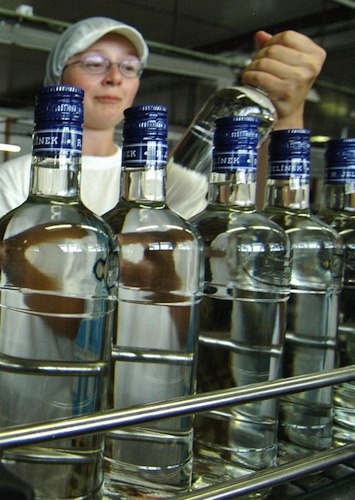The Czech Republic’s biggest producer of plum brandy (slivovice) and other hard spirits distilled from fruit, eastern Moravian-based Rudolf Jelínek, has decided to move its parent company to the Netherlands. But the historic firm denies that it is following a series of other major Czech corporations who have made the transfer for tax reasons.
“Everyone cites taxes, but that is not the reason because in the Netherlands the corporate tax rate is 20 percent, so there is no saving. One reason is the degree of protection. Between the Czech Republic and Netherlands there is a very good investment protection agreement in place,” deputy board chairman and company shareholder Zdeněk Chromý told the business paper E15.
Legal environment
Better conditions for negotiating with partners and suppliers and for acquisitions and a more stable legal environment were also factors, the company said. While the parent company, R. Jelínek Group, is making the move, production of the distilled hard spirits will remain in eastern Moravia, where the company says it is rooted in a 400-year-old local tradition of distilling; the Jelínek company itself dates back to 1894.
Many large Czech companies, such as investment group PPF, pharmaceutical company Zentiva and energy and financial conglomerate KKCG, have in recent years opted to transfer their company headquarters to the Netherlands or Dutch offshore tax havens for financial and other reasons. Prominent Czech businessman Zbyněk Frolík of Linet plans to shift his international hospital beds and equipment business to the Netherlands this summer. He cited the turnaround in Czech laws which helped cause a boom of investment in solar power as the main reason for his decision.
The flurry of Dutch transfers represents a worrying trend for the Czech Ministry of Finance.
Frolík said he suspected the boom was in part motivated by some members of parliament wanting to take part in it and get rich. But the uproar over public funds that followed resulted in lawmakers hurriedly putting a brake on solar investment with one of the measures consisting of a now contested retrospective tax on profits of 26 percent. The lack of investment security shown by this episode was the final straw making him decide for the move, Frolík explained.
No Dutch treat for Czechs
The flurry of Dutch transfers represents a worrying trend for the Czech Ministry of Finance which has seen overall revenues, and in particular corporate tax, in the first half of the year undershoot expectations and fresh moves by Finance Minister Miroslav Kalousek (TOP 09) to cast around for more money raising measures. Unions complain that the Czech tax burden falls unfairly on employed workers with the self-employed and companies getting a cushy deal.
Kalousek, whose center-right party draws on a lot of its support from the self employed and small business sectors, is, however, now looking to squeeze them for more taxes by cutting an automatic rate for tax write-offs if they do not want to go through a more complicated and detailed filing for tax reductions. Kalousek and the coalition government (ODS-TOP 09-VV) have pledged to balance the budget by 2016.
The Jelínek distillery company made a regular profit of Kč 20 million–Kč 30 million a year over the last five years. As a result of a spat with a bankruptcy administrator in a case marginal to the company’s core activities, the distiller was threatened with its accounts being frozen and property seized in 2009.
— Lukáš Novotný contributed to this article




